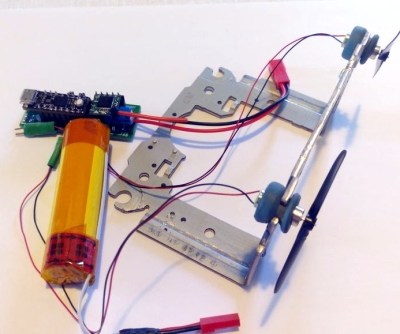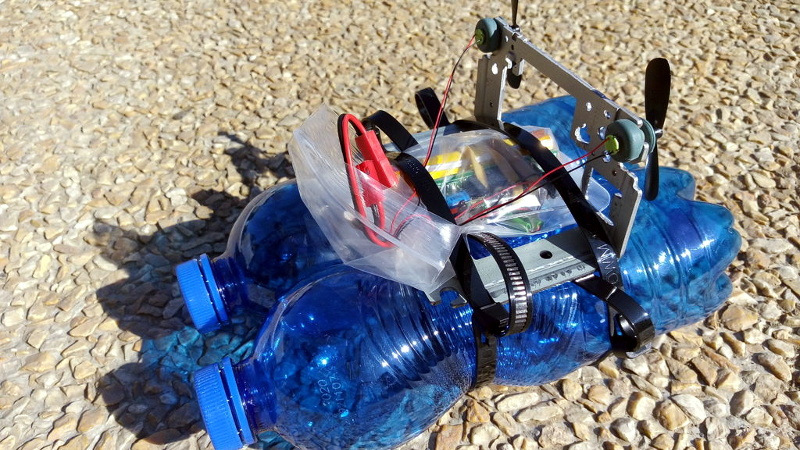What do you get when you combine an old optical drive, some empty soda bottles, and a microcontroller? Well…nothing, really. That’s still just a pile of rubbish. But if you add in a battery, an RC receiver, and some motors, you’re getting dangerously close to a fun little toy to kick around the pond as [Antonio Rizzo] recently demonstrated.
 A couple of plastic bottles lashed together make up the hull of the boat, and [Antonio] has used the internal frame of an old optical drive bent at a 90 degree angle to hold the two small DC motors. In a particularly nice touch, the drive’s rubber anti-vibration bushings are reused as motor mounts, though he does admit it was just dumb luck that the motors were a perfect fit.
A couple of plastic bottles lashed together make up the hull of the boat, and [Antonio] has used the internal frame of an old optical drive bent at a 90 degree angle to hold the two small DC motors. In a particularly nice touch, the drive’s rubber anti-vibration bushings are reused as motor mounts, though he does admit it was just dumb luck that the motors were a perfect fit.
For the electronics, [Antonio] has paired a custom motor controller up with the uChip, a diminutive Arduino-compatible microcontroller in a narrow DIP-16 package. Wireless communication is provided by an off-the-shelf cPPM receiver such as you might see used in a small plane or quadcopter.
The whole build is powered by a common 18650 lithium-ion battery, which could also be easy enough to recover from the trash given how common they are in laptop batteries; though if you threw a new cell into this build we wouldn’t hold it against you. Everything is put into a high-tech plastic sandwich bag to provide minimum of waterproofing with the minimum of effort.
If using a commercial RC receiver and transmitter is a bit too mainstream for your tastes, you could always roll your own radio.
















uChip is maybe not the greatest dev board out there, but it’s not nice to call it garbage/rubbish.
Why is this even a “hack”?
Depends on how you define ‘Hack’…
Fits my definition really well, since it’s about taking an idea, and making it happen with the tools, materials, a skills you have available. Has nothing to do with developing a marketable product. Doesn’t have to be cheaper or better than a commercial product.
Bonus points for repurposing parts that would normally go in the trash.
Mostly, hacking is figuring out a solution to a problem, the value is in learning how things work, and learning things that can be applied to future projects.
+1
Well, I’d say that:
– I agree that “figuring out a solution to a problem” is a hack, but in this case this isn’t a solution as there wasn’t a problem to start with.
– I’d also agree that a hack is about “repurposing parts that would normally go in the trash”. But then, my garbage doesn’t contain a uChip combined with “a battery, an RC receiver, and some motors”, because like deshipu, that’s certainly not stuff I’d consider throwing away.
So I agree with Luke that putting some stuff together one afternoon out of boredom doesn’t make it a hack. Otherwise, my kid “hacked” a pirate boat out of a lolly stick and an empty egg carton (bonus points for genuinely “repurposing parts that would normally go in the trash”). Where do I post it?
Did he make it remote controlled? Write any code? No? There’s your answer.
Scrap pile might have been a more ‘politically’ correct term, which some would argue the value and worth. A master hacker might have pulled off a total trash hack, and many others might do okay with mostly scrap, but not everybody has those skills, yet. Sometimes, you have to buy a few parts to fill in the gaps, since there are limits to the quantity and quality of scrap items that on can live with. I’ve got several board items, either saved out of things I’ve scrap, projects that didn’t work out, or maybe I decide to go a different direction. Basically, sitting around, waiting for me to find a use for them. I could certainly used the space (for more stuff). I consider my collection of spare parts and unused boards, scrap, since they aren’t doing anything useful, yet.
So, how many of your projects have been featured on HAD? Regardless of the creative writing, you seem to find offensive, the dude built something, doubt he wrote the article too. The build did give me some ideas about a busted toy quad I’ve got laying around… Gee, I learned something from all this.